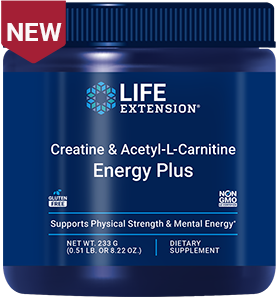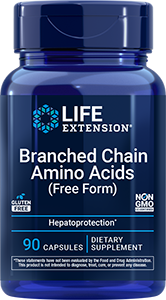
BCAAs vs. Creatine: What to Add to Your Workout Regimen
Published: September 2024
Staying fit is a lifelong mission. And nutritional supplements can help, with products designed to boost performance in the gym, promote faster recovery, support muscle building goals, and foster general well-being.
Among the protein powders, pre-workout drinks and other exercise-related supplements, two of the most popular are branched-chain amino acids (BCAAs) and creatine. Both have long been favorites among weekend warriors and serious athletes alike.
So which is right for you? We'll break down each nutrient, discussing their pros and cons, to give you everything you need to decide whether to take creatine, BCAAs or both!
BCAAs: The breakdown
Branched-chain amino acids are essential amino acids that combine to form proteins—the building blocks of life that are needed by every cell in your body. They are called "branched chain" because of their branched chemical structure, which is different from other amino acids. The BCAAs leucine, isoleucine, and valine make up 35% of the essential amino acids in muscle proteins—and your body can't make these, they must be obtained through diet. High-protein foods like meat, eggs and soybeans deliver BCAAs, but supplements can help make sure you're getting enough, especially if you exercise regularly or are trying to get stronger and build lean muscle.
Why take BCAAs?
Branched-chain amino acids are a popular supplement among those looking to increase muscle protein synthesis and stimulate growth in muscle tissue (i.e., people who want to show off their gains when they hit the beach).
But that's not all. BCAAs are also known for their ability to support exercise performance (get a leg up in the gym—literally!) and promote post-exercise muscle recovery. A review of eight clinical studies found that taking BCAAs after a workout helped with exercise recovery and occasional muscle soreness when compared with passive recovery and rest alone. BCAAs also encourage immune cell function and help inhibit age-related muscle decline.
So if you find yourself struggling to keep up with your kids or grandkids when you run around the park, or taking more rest days than planned after your workouts, you might want to add BCAA supplements to your routine. They could have you back in the gym more quickly after a tough workout. Even if you are new to your fitness journey or prefer cozier workouts in the comfort of home, you could still benefit from the muscle-maintaining benefits of BCAAs.
How do BCAAs support muscle growth?
A major function of BCAAs involves supporting protein synthesis in the muscles, or making muscles. Because protein is key to building muscle, BCAAs can help complement gains in muscle tissue, especially when combined with resistance exercise and a healthy diet rich in protein. BCAAs can also help keep you from losing muscle over time, which is a larger concern as we age.
Can I take BCAAs every day?
BCAAs have been used in clinical studies in doses up to 12 g daily. They are well-tolerated in everyday doses to help promote lean muscle building and other exercise-related goals. While many prefer to take BCAAs before or after exercise, be sure to read the product labels and take any supplement as directed.
Creatine: What you need to know
Creatine monohydrate is another popular fitness supplement prized for its ability to support exercise performance during resistance training and other workouts. Creatine works by encouraging healthy muscle function and cellular energy production, turning ADP into ATP—the main source of energy for your cells.
Creatine is an amino acid derivative produced by the pancreas, liver, and kidneys. It can also be obtained through diet—particularly in meat like chicken and beef and in seafood. But getting enough dietary creatine to have an appreciable effect on your workout performance and muscle health is difficult, which is why many take it as a supplement.
What are the benefits of creatine?
Like BCAAs, creatine helps maintain lean muscle mass, strength and power. It also fuels exercise performance, endurance and recovery. In research, creatine supplementation had a statistically significant effect on athletic performance, with some studies also discovering a notable boost in performance during resistance training for creatine users aged 50 and older. So whether you want to achieve explosive workouts, or you just feel your birthday cakes have an awful lot of candles these days, you might benefit from creatine supplementation.
Additional studies have gone into considerable depth on the exercise-specific benefits of creatine. Increased cellular creatine is associated with boosts in strength, total power output, and sprinting speed. And creatine's muscle-building benefits go beyond performance and into support for muscle recovery, helping to reduce your need for rest between sets and between workouts.
This energy-promoting compound also has been studied for neurological and cognitive health, and research has shown it may promote a healthy mood.
When should you take creatine?
Creatine can be taken daily as part of your regular supplement regimen. Some research suggests that creatine might be more effective in helping strengthen and maintain muscles if taken after a workout, but consistency is more important than timing. Test out a few different times of the day to see how taking creatine affects your performance. Just remember to follow the dosage on the label unless your healthcare provider tells you otherwise.
Are BCAAs or Creatine Better?
Because both BCAAs and creatine promote workout performance, reduce muscle soreness, and boost muscle growth, you may wonder which is better from a nutrition standpoint. But one is not "better" than the other, and your decision will depend on your ultimate health goals.
Both BCAAs and creatine help to build and maintain muscle strength and endurance when combined with exercise. Both nutritional supplements support physical performance and muscle recovery.
But research shows BCAAs may help support immune health in athletes. And creatine delivers the added punch of healthy energy support, helping to maintain power not just in your exercise routine but also in your most important muscle: your heart.
Can you take BCAAs and creatine together?
BCAAs and creatine top the "fitness favorite" lists of many athletes, and these two powerhouse nutrients can be taken together, which may help boost your workouts even more. Many supplements make this easy, offering a combination of these nutrients, usually in a protein powder mix.
By taking BCAAs and creatine together, you can benefit from the energy support and muscle support needed to power through your workout and achieve your fitness goals. You can also encourage your immune, heart and brain health with these nutrients.
One convenient (and tasty) way to add both of these workout workhorses to your routine is with a whey protein isolate powder like Wellness Code®, which delivers 14 grams of protein, plus BCAAs and 2 grams of creatine per scoop, as well as the amino acid L-glutamine for additional muscle recovery support.
How can BCAAs and creatine be part of a healthy lifestyle?
We've spent a lot of time singing the praises of both BCAAs and creatine, but at the end of the day, they're just tools. On their own they won't help you achieve your muscle health goals. They need to be combined with resistance exercise to help build and maintain muscle mass.
To get the most of BCAA and creatine supplementation, the three biggest things you should add to your lifestyle (if you don't already) are regular exercise, healthy nutrition, and proper rest and recovery.
Exercise sends your body the signal to direct resources toward growing muscles. The fact that BCAAs help grow muscle tissue won't do you any good if you're not training your muscles in the first place, so be sure to exercise a few times a week.
Then, there's nutrition. If you are trying to build or maintain muscle mass, you should prioritize protein in your daily meals, and consider supplementing with protein before or after workouts. But remember, a healthy diet is key to wellness. If you don't ingest the proper fuel every day to support overall health, workout supplements won't help much. You can't protein shake your way out of a diet that consists of subpar nutrients from foods like potato chips (though most foods are fine in moderation).
Probably the most under-emphasized aspect of a health and fitness routine is rest—not just taking days off (which is obviously important) but getting enough sleep each night. Both your mind and your body will function better when they have the time required to recharge.
Other workout supplements to try
In addition to the healthy diet and rest that are needed to support any fitness journey, other workout supplements may be able to help you reach your goals.
Protein: We know protein fuels muscle growth, but it has other health benefits as well. Protein helps you feel full longer, which keeps the munchies at bay, and helps boost your metabolism and fat-burning. Research also links protein intake with bone, immune and heart health.
Acetyl-L-Carnitine: Carnitine, an amino acid derivative, plays an important role in energy production, carrying fatty acids to the mitochondria in cells to be turned into ATP energy. Acetyl-L-carnitine also supports cognitive function and help reduce mental fatigue, so it benefits both mind and body.
Taurine: Another cellular energy-supporting amino acid, taurine's antioxidant activity helps to protect mitochondria and promote heart and cognitive function, overall vascular function, and eye health. Taken before a workout, taurine encourages exercise performance, endurance and more.
Take a health needs quiz to get supplement recommendations based on your individual needs, and take your fitness to the next level.
About the Author: Trent Fowler has been covering health and wellness for more than a decade. A technical writer and content specialist, he is also the co-host of the Futurati Podcast and writes about fintech, AI, and other emerging technologies.
References
- Antonio J, et al. "Common questions and misconceptions about creatine supplementation: what does the scientific evidence really show?" J Int Soc Sports Nutr. February 2021. https://www.ncbi.nlm.nih.gov/pmc/articles/PMC7871530/
- Bonvini A, et al. "Immunomodulatory role of branched-chain amino acids." Nutr Rev. November 2018. https://pubmed.ncbi.nlm.nih.gov/30124936/
- Jaramillo AP, et al. "Effectiveness of Creatine in Metabolic Performance: A Systematic Review and Meta-Analysis." Cureus. September 2023. https://pubmed.ncbi.nlm.nih.gov/37720119/
- Martinho DV, et al. "Oral Branched-Chain Amino Acids Supplementation in Athletes: A Systematic Review." Nutrients. September 2022. https://www.ncbi.nlm.nih.gov/pmc/articles/PMC9571679/
- Rahimi MH, et al. "Branched-chain amino acid supplementation and exercise-induced muscle damage in exercise recovery: A meta-analysis of randomized clinical trials." Nutrition. October 2017. https://pubmed.ncbi.nlm.nih.gov/28870476/
- Wax B, et al. "Creatine for Exercise and Sports Performance, with Recovery Considerations for Healthy Populations." Nutrients. June 2021. https://www.ncbi.nlm.nih.gov/pmc/articles/PMC8228369/
- Wolfe RR. "Branched-chain amino acids and muscle protein synthesis in humans: myth or reality?" J Int Soc Sports Nutr. August 2017. https://www.ncbi.nlm.nih.gov/pmc/articles/PMC5568273/
Always be in the know!
Access the latest deals, wellness news, expert health tips & more!












